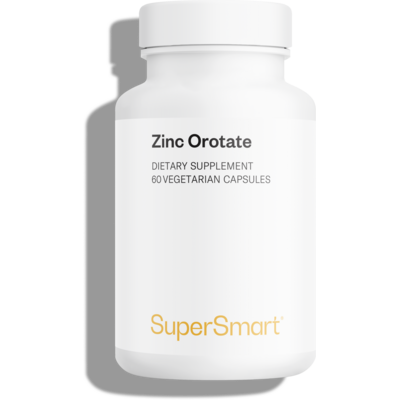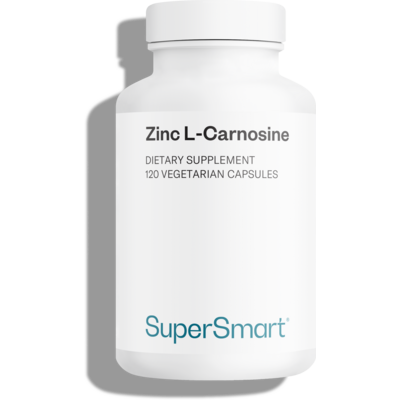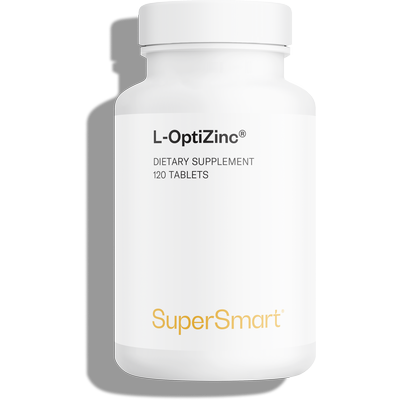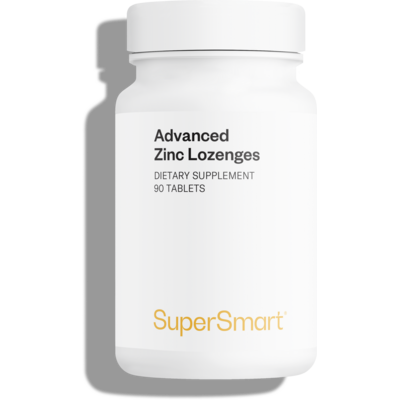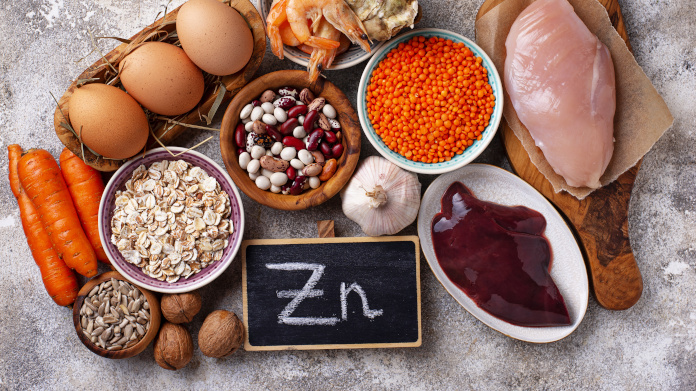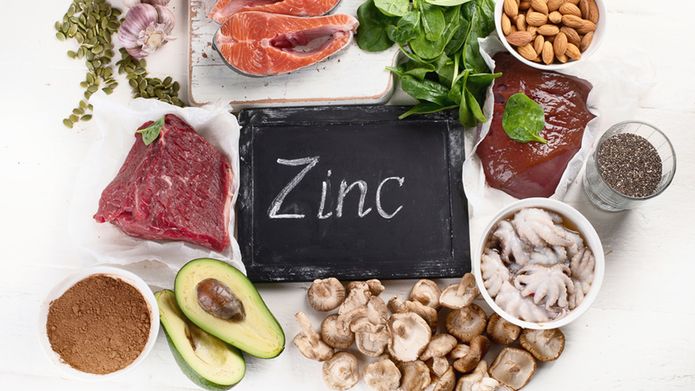Zinc deficiency: how to recognize and prevent it
Think you might be deficient in zinc? Discover the symptoms of an inadequate zinc intake, the probable causes and the best sources of this trace-element.

Zinc: a trace-element with many benefits
Zinc is a very important trace-element involved in multiple processes in the human body.
It is mainly contained in the bones, teeth, hair, skin, liver, muscle - and in men - the testes.
Zinc is a component of several hundred enzymes including a large number of nicotinamide adenine dinucleotide (NADH) dehydrogenases, RNA and DNA polymerases, and DNA transcription factors, as well as alkaline phosphatase, superoxide dismutase and carbonic anhydrase (1).
In practical terms, the American health authorities recognize that zinc helps protect cells against oxidative stress, and supports normal immune system function, DNA synthesis, cognitive function, fertility, testosterone levels, and skin, bones, nails and hair.
Zinc is popular with, amongst others, sportspeople, especially bodybuilders. It often features in cosmetic and/or dermatological products and even healing balms (2).
Symptoms of zinc deficiency
A lack of zinc can cause one or more of the following symptoms (3):
- diarrhea;
- loss of appetite;
- open sores and wounds that don’t heal;
- sudden, unexplained weight loss;
- excessive sugar cravings;
- deterioration in mood (apathy);
- lack of concentration;
- prevalence of respiratory infections and immune dysfunction in general;
- decreased sense of taste and/or smell;
- night vision and eye health problems;
- erectile dysfunction in men;
- abnormal development of sex organs (in young people in the growth stage);
- decreased alertness;
- memory problems;
- delayed growth in children;
- complications in pregnancy;
- skin problems (acne);
- psoriasis;
- nail and hair loss.
However, these symptoms can also be caused by other deficiencies and diseases, so we’d recommend consulting a health professional for an accurate diagnosis if you are affected by any of them.
Lack of zinc: what are the causes?
As you might imagine, zinc deficiency is usually the result of under-consumption of foods that contain it.
However, it’s worth noting that certain groups of people are at higher risk of zinc deficiency:
- those taking diuretics or certain other medications (such as proton pump inhibitors);
- those suffering from diabetes mellitus, sickle cell disease, chronic kidney disease, liver disease, problems with alcohol consumption or malabsorption, and those who have undergone bariatric surgery;
- those who have suffered acute, serious, stressful health events (such as sepsis, burns or head trauma);
- elderly patients who are institutionalised or house-bound;
- pregnant women;
- those eating a vegetarian diet (or other restrictive diets).
Good to know: phytates reduce the bioavailability of zinc
Plant seeds contain phytate anions which are their primary means of storing phosphorus and minerals. But these phytates, or phytic acid, are considered anti-nutrients insofar as they make nutrients less bioavailable to the body, nutrients that include iron, calcium… and zinc (4)!
To reduce the phytate content of plant foods such as oilseeds and legumes, it’s important to pre-soak them and to eat them cooked or sprouted. This way, you’ll obtain the benefits of zinc, vegetarians included.
Zinc-rich foods
As is the case with iron, zinc from animal protein is more bioavailable, and the best dietary sources of zinc are all animal-source foods. Having said that, it’s entirely possible to meet your zinc requirements from a vegetarian diet, provided you follow the above-mentioned advice.
Here’s a list of the top zinc-rich foods in descending order (5) :
- oysters;
- calves’ liver;
- beef;
- veal;
- lamb;
- crab;
- crayfish;
- beef or pork liver;
- pork;
- egg yolk;
- wheatgerm;
- sesame seeds and tahini;
- clams;
- lobster;
- chicken;
- shiitake mushrooms;
- pumpkin seeds.
Which are the best zinc supplements for preventing deficiency?
Besides eating a balanced, high-protein diet, especially animal protein, you can ensure an adequate daily zinc intake by taking a dietary supplement.
There are various forms of zinc available in supplement form, including:
- zinc orotate: zinc can be combined with orotates, organic mineral salts found in dairy products, amongst others, which significantly increases its bioavailability (one such example is the product Zinc Orotate) (6);
- zinc methionine: zinc is also thought to be better absorbed when combined with the amino acid L-methionine. What’s more, this form may offer 4-6 times more antioxidant potency than standard zinc salts such as zinc oxide or zinc sulfate (one such supplement is L-OptiZinc®) (7);
- zinc L-carnosine: studies have for many years concluded that combining zinc with the amino acid L-carnosine may help protect the digestive system and reduce the discomfort of acid reflux (try Zinc L-Carnosine) (8-9);
- zinc bisglycinate: combining zinc with two glycine molecules improves the trace-element’s stability, protects it from stomach acidity and thus ensures optimal uptake (that’s precisely the case with Advanced Zinc Lozenges, an excellent zinc supplement in the form of suckable tablets).
SuperSmart ADVICE
References
- PRASAD, A. S. Discovery and importance of zinc in human nutrition. In : Federation proceedings. 1984. p. 2829-2834.
- KHALED, S., BRUN, J. F., BARDET, L., et al.Importance physiologique du zinc dans l'activité physique. Science & sports, 1997, vol. 12, no 3, p. 179-191.
- CLASSEN, Hans-Georg, GRÖBER, Uwe, LÖW, Dieter, et al.Zinc deficiency. Symptoms, causes, diagnosis and therapy. Medizinische Monatsschrift fur Pharmazeuten, 2011, vol. 34, no 3, p. 87-95.
- WISE, A. Phytate and zinc bioavailability. International journal of food sciences and nutrition, 1995, vol. 46, no 1, p. 53-63.
- SOLOMONS, Noel W. Dietary sources of zinc and factors affecting its bioavailability. Food and nutrition bulletin, 2001, vol. 22, no 2, p. 138-154.
- ANDERMANN, G. et DIETZ, M. The bioavailability and pharmacokinetics of three zinc salts: zinc pantothenate, zinc sulfate and zinc orotate. European Journal of Drug Metabolism and Pharmacokinetics, 1982, vol. 7, no 3, p. 233-239.
- WEDEKIND, K. J., HORTIN, AEa, et BAKER, D. H. Methodology for assessing zinc bioavailability: efficacy estimates for zinc-methionine, zinc sulfate, and zinc oxide. Journal of animal science, 1992, vol. 70, no 1, p. 178-187.
- Choi H.S., Kim E.S., Keum B., Chun H.J., Sung M.-K. Betaine Chemistry, Analysis, Function and Effects. Royal Society of Chemistry; London, UK: 2015. L-Carnosine and Zinc in Gastric Protection; pp. 548–565.
- Mahmood A., FitzGerald A.J., Marchbank T., Ntatsaki E., Murray D., Ghosh S., Playford R.J. Zinc carnosine, a health food supplement that stabilises small bowel integrity and stimulates gut repair processes. 2007;56:168–175. doi: 10.1136/gut.2006.099929.
- GANDIA, BOUR, MAURETTE, et al.A bioavailability study comparing two oral formulations containing zinc (Zn bis-glycinate vs. Zn gluconate) after a single administration to twelve healthy female volunteers. International journal for vitamin and nutrition research, 2007, vol. 77, no 4, p. 243-248.
Keywords
1 Days
Order was shipped on time and packaged…Wonderful Jobs!
Order was shipped on time and packaged excellently.
DMHoge
8 Days
great products and prices
great products and prices
Marie
13 Days
Easy to navigate site
Easy to navigate site, had what I was searching for, good price. easy order-check out
James Tucker
20 Days
My skin is clearing up nicely!
Pretty good for my skin so far.
Christian
22 Days
The new packaging is excellent
The new packaging is excellent - finally! No more squashed boxes and torn envelopes.
GORAN
23 Days
Great Product
Great Product
Larry Garrett
27 Days
Quick shipping
Quick shipping; good price. No issues!
Mary McCarty
28 Days
Thr product is very good and is helping…
Thr product is very good and is helping me on my health. Then is always on time
LUGO Luz
31 Days
Buying was fine
Buying was fine. I had problems with the website not recognizing my login info, and had to call to get it fixed. Other than that, everything was good.
David S. Clark
31 Days
Your super maca and super ginseng are…phenomenal
Your super maca and super ginseng are phenomenal supplements that compliment each other when taking them together. Fantastic feeling of well-being and lots of mid day energy without the crash.
Keith Mason
34 Days
I have had amazing results with every…
I have had amazing results with every supplement I've purchased. I am extremely satisfied with this company
kirstin Torres
34 Days
Fine products
Fine products . They are on the leading edge of online supplements. The only issue -so far-is they sometime run out of subscription items.
Jason Argos
37 Days
The ordering process is very user…
The ordering process is very user friendly and the products always come in a timely manner.
CARTER Rhonda
38 Days
The price for Dr
The price for Dr. Pero's AC-11 is reasonable and in line with his views. (my former colleague). Keep it pure.
CAMPBELL Clayton
41 Days
Right on every time.
Right on every time.
Arthur Nicholas


